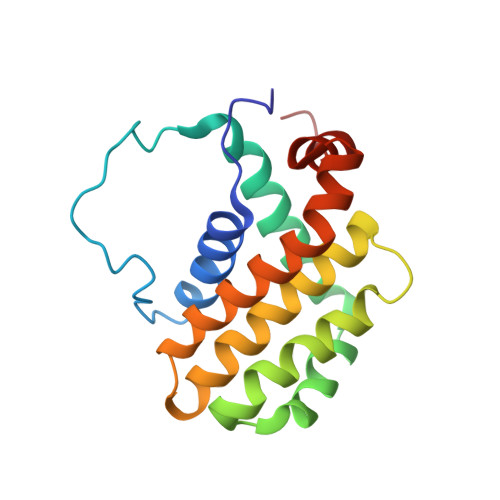Studies Leading to Potent, Dual Inhibitors of Bcl-2 and Bcl-xL.
Bruncko, M., Oost, T.K., Belli, B.A., Ding, H., Joseph, M.K., Kunzer, A., Martineau, D., McClellan, W.J., Mitten, M., Ng, S.C., Nimmer, P.M., Oltersdorf, T., Park, C.M., Petros, A.M., Shoemaker, A.R., Song, X., Wang, X., Wendt, M.D., Zhang, H., Fesik, S.W., Rosenberg, S.H., Elmore, S.W.(2007) J Med Chem 50: 641-662
- PubMed: 17256834
- DOI: https://doi.org/10.1021/jm061152t
- Primary Citation of Related Structures:
2O1Y, 2O21, 2O22, 2O2F, 2O2M, 2O2N - PubMed Abstract:
Overexpression of the antiapototic proteins Bcl-2 and Bcl-xL provides a common mechanism through which cancer cells gain a survival advantage and become resistant to conventional chemotherapy. Inhibition of these prosurvival proteins is an attractive strategy for cancer therapy. We recently described the discovery of a selective Bcl-xL antagonist that potentiates the antitumor activity of chemotherapy and radiation. Here we describe the use of structure-guided design to exploit a deep hydrophobic binding pocket on the surface of these proteins to develop the first dual, subnanomolar inhibitors of Bcl-xL and Bcl-2. This study culminated in the identification of 2, which exhibited EC50 values of 8 nM and 30 nM in Bcl-2 and Bcl-xL dependent cells, respectively. Compound 2 demonstrated single agent efficacy against human follicular lymphoma cell lines that overexpress Bcl-2, and efficacy in a murine xenograft model of lymphoma when given both as a single agent and in combination with etoposide.
Organizational Affiliation:
Cancer Research, Global Pharmaceutical Research and Development, Abbott Laboratories, 100 Abbott Park Road, Abbott Park, Illinois 60064, USA.















